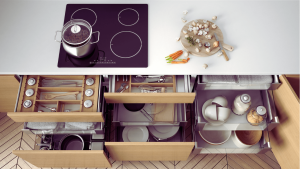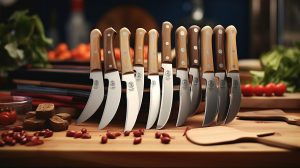Welcome to our article, where we will answer the age-old question, “Can you jump into the ‘kitchen’ in pickleball?” Pickleball is a fun and exciting sport that has recently gained immense popularity. However, many players still need to learn about the rules and regulations surrounding the kitchen zone. In this article, we will clarify these rules and provide you with a clear understanding of the kitchen in pickleball. So let’s dive in!
Key Takeaways
- The kitchen, also known as the non-volley zone, is a designated area on the court near the net.
- Jumping into the kitchen while making a shot is considered a violation in pickleball and can result in penalties and loss of points.
- Adhering to the kitchen rules is crucial for all serious players to ensure an enjoyable and fair game.
Understanding the Kitchen in Pickleball
In pickleball, the kitchen is a designated area on the court that spans seven feet from the net in both directions and is marked by a line. This area is also known as the non-volley zone. The purpose of the kitchen is to prevent players from gaining an unfair advantage by volleying the ball close to the net.
It is important to note that stepping into the kitchen while volleying the ball is considered a violation and can result in penalties and loss of points. Adhering to kitchen rules in pickleball is crucial to fair play and maintaining balance during the game.
The Importance of Kitchen Rules
Here at our pickleball center, we take kitchen rules very seriously. It’s not just about following the rules; it’s about maintaining a fair playing field for everyone involved. Violating kitchen rules, such as stepping into the non-volley zone, can result in penalties and losing points, which can make or break a game.
It’s important to understand that kitchen violations can happen to anyone, even the most experienced players. That’s why it’s crucial to be familiar with the rules and always be mindful of your positioning on the court. By following the rules, we can ensure everyone has an equal chance to play and enjoy the game.
Can You Jump into the Kitchen?
At the heart of this article is the question of whether or not you can jump into the kitchen in pickleball. The answer is simple: no, you cannot. According to the official rules, any part of a player’s body, including their feet, entering the kitchen area while making a shot is considered a violation. This rule aims to prevent players from gaining an unfair advantage by eliminating their ability to attack the ball aggressively from close to the net.
As mentioned in the previous section, the kitchen, or non-volley zone, is a seven feet area on the court near the net, marked by a line. Players are prohibited from stepping into this area while making a shot, including jumping. Violating this rule can result in penalties and loss of points.
To maintain fair play and avoid penalties, it is essential to master proper footwork and positioning on the court. The following section discusses strategies for preventing kitchen violations and enhancing gameplay.
Penalties for Kitchen Violations
Violating kitchen rules can result in severe penalties during a pickleball game. If you or your opponent touches the kitchen while volleying the ball, it is considered a fault, and the opposing team is awarded the point. This can be frustrating, especially if the game is close or you are about to score a point. Repeated kitchen violations can result in disqualification from the competition, which is something you want to avoid if you’re serious about playing pickleball.
It’s essential to be mindful of your positioning and avoid stepping into the kitchen. This helps you avoid penalties and encourages fair play and a balance on the court. Rather than relying on kitchen violations or other rule-breaking tactics, winning the game through skill and strategy is always better.
Strategies for Avoiding Kitchen Violations
Now that we understand the importance of following kitchen rules let’s explore some strategies to help avoid violations and maintain fair play.
Master Proper Footwork
Footwork is essential in pickleball, and it is especially crucial when it comes to the kitchen. Positioning yourself correctly and keeping your feet outside the kitchen can prevent violations and keep you in the game. Practice moving in and out of the kitchen area to fully control your movements.
Use the Lob Shot
If the ball is hit low and close to the net, consider using a lob shot to avoid stepping into the kitchen. This shot can effectively keep the ball in play while staying clear of the non-volley zone. Practice and become comfortable with this technique to add it to your gameplay.
Stay Alert
Be aware of your positioning and alert for incoming shots that could land close to the kitchen. Keep an eye on your opponent’s movements and be ready to react quickly to avoid any accidental kitchen violations.
Communicate with Your Partner
- If you are playing doubles, communication with your partner is integral in avoiding kitchen violations. Work together to cover the court and coordinate your movements to keep at least one of you outside the kitchen at all times.
By practicing these strategies and keeping the importance of kitchen rules in mind, you can avoid violations and enhance your overall gameplay. Remember, maintaining fair play and sportsmanship is essential to enjoying the game of pickleball. Let’s stay focused and have fun on the court!
The Role of Kitchen Rule Enforcement
Enforcing kitchen rules is a shared responsibility between players and referees. As players, we must be conscious of our positioning on the court and avoid stepping into the kitchen to prevent violations. Referees play a crucial role in making impartial judgments and penalizing violations when necessary. We need to respect and follow the decisions made by referees to maintain a fair and enjoyable game.
If you notice a potential kitchen violation, raising the issue with the referee is important. However, avoiding disrupting the game’s flow and acting sportsmanlike when raising concerns is also essential. By working with the referee, we can ensure that potential violations are addressed promptly and fairly.
Common Misconceptions about Jumping into the Kitchen
Some everyday things could be improved regarding the kitchen in pickleball. One of the most common is that you can jump over the kitchen line. However, this is different. The rule stipulates that any part of the player’s body, including the feet, entering the kitchen area is considered a violation.
Another misconception is that only the player who volleys the ball into the kitchen is penalized. This is not true. If any player touches the kitchen while volleying the ball, it is considered a fault, and the opposing team is awarded the point. Therefore, players must be mindful of their positioning and avoid entering the kitchen area.
Strategies for Utilizing the Kitchen
While jumping into the kitchen is not allowed in pickleball, there are still ways to utilize the kitchen area to your advantage. Skilled players position themselves outside the kitchen line, the transition zone, to be ready for quick volleys and take advantage of opponents’ shots that land short.
The transition zone is an excellent position because it allows you to hit aggressive shots while giving you time to recover to the baseline if needed. Being able to anticipate when your opponent will hit a short trial and being ready to pounce on it can be a game-changer.
One strategy to utilize the kitchen is to move your opponent back and forth between the kitchen and the baseline. Doing so can create openings to hit winners or force your opponent into making an error.
The Importance of Proper Footwork
To effectively use the kitchen area, proper footwork is crucial. This involves moving quickly and smoothly from the baseline to the kitchen line. Maintaining balance and control while driving and hitting shots is important, which can be achieved through footwork drills and focusing on your form.
The Two-Step Rule
Another way to take advantage of the kitchen area is by utilizing the “two-step rule.” This rule allows you to step into the kitchen after hitting a volley as long as you immediately step back out. By doing so, you can hit a volley from a position closer to the net without violating any rules.
Conclusion
Mastering the strategies for utilizing the kitchen can give you a significant advantage over your opponents in pickleball. By positioning yourself outside the kitchen line, practicing proper footwork, and using the two-step rule, you can improve your overall gameplay and dominate the court.
The Evolution of Kitchen Rules
Over the years, the kitchen rules in pickleball have been refined to promote fairness and competitiveness. Originally called the “non-volley zone,” the kitchen was created to prevent players from gaining an unfair advantage by volleying the ball close to the net. As the game grew in popularity, the rules surrounding the kitchen were updated to ensure that players could not dominate the game by overpowering their opponents near the net.
In 1990, the American Sports Builders Association (ASBA) collaborated with the USAPA to develop standard court dimensions and rules for the game, including the kitchen. The rules were further refined in 2001 when the USAPA created a dedicated rulebook for pickleball. This rulebook includes strict enforcement of kitchen violations, with penalties such as the loss of points and disqualification from the game.
As pickleball continues to grow in popularity, new interpretations of the rules may arise, requiring players to stay updated on any changes or updates. Staying informed on the latest kitchen rules and practicing regularly can help players maintain fair play and enhance their performance on the court.
The Role of Kitchen Rule Enforcement
As mentioned earlier, the responsibility of enforcing kitchen rules falls on players and referees. While players must be aware of their positioning and avoid kitchen violations, referees are crucial in ensuring impartial judgments and penalizing violations when necessary. Doing so provides a fair and enjoyable game for all players involved.
Players sometimes may dispute a referee’s decision regarding a kitchen violation. In these situations, players can challenge the ruling through the challenge system, which allows for a review of the call. It is important to note that the challenge system may differ depending on the level of play or tournament rules.
Practice Makes Perfect
Mastering proper footwork and positioning on the pickleball court can take time and practice, but avoiding kitchen violations and improving your overall gameplay is essential. Here are some tips to help you practice and improve:
- Begin with basic footwork drills focusing on moving quickly and efficiently around the court.
- Practice your positioning by placing cones or markers on the court to represent the boundaries of the kitchen area.
- Practice with a partner or a ball machine to develop your reflexes and volleys.
- Join a local pickleball league or attend clinics to receive expert guidance and practice with other players.
By dedicating time and effort to practice, you can develop the necessary skills and techniques to enhance your performance on the pickleball court. Remember, the more you practice, the better you’ll become!
Enjoy the Game Responsibly
As pickleball enthusiasts, we know how exciting and enjoyable the game can be. However, we must prioritize fair play and sportsmanship while on the court. Understanding and following the kitchen rules is crucial to maintaining balance and preventing unfair advantages. Remember to respect the non-volley zone and avoid stepping into it while volleying the ball. Violating kitchen rules can result in penalties and harm the game’s fairness and enjoyment.
Playing pickleball is an excellent way to stay active and have fun. However, playing responsibly by following the rules and engaging in fair play is essential. Remember to communicate respectfully with other players and referees and adhere to the regulations set forth by the game. By doing so, we can ensure an enjoyable and fulfilling pickleball experience for all players involved.
Conclusion
As we have explored, the kitchen in pickleball is crucial to ensure fair play and balance during the game. Violating kitchen rules, such as stepping into the kitchen while volleying, can result in penalties and a loss of points. While jumping into the kitchen is not allowed, players can strategically position themselves outside the kitchen area to gain an advantage during the game. It is essential to respect and follow the decisions made by referees to maintain a fair and enjoyable game.
Practicing regularly is crucial to avoid kitchen violations and improve your overall gameplay. By dedicating time to practice, you can develop the necessary skills and techniques to enhance your performance on the pickleball court. Remember, following the rules and respecting the kitchen boundaries contribute to fair play and an enjoyable experience for everyone involved in the game.
FAQ
Q: Can you jump into the ‘kitchen’ in pickleball?
A: According to the official rules, you cannot jump into the kitchen while making a shot. Jumping into the kitchen is considered a violation and can result in penalties.
Q: What is the kitchen in pickleball?
A: The kitchen, also known as the non-volley zone, is a designated area on the court located near the net. It spans seven feet from the net in both directions and is marked by a line. The purpose of the kitchen is to prevent players from gaining an unfair advantage by volleying the ball close to the net.
Q: Why are kitchen rules important?
A: Adhering to kitchen rules in pickleball is crucial to fair play and maintaining balance during the game. Violating kitchen rules can result in penalties and loss of points. Understanding and following these rules is essential for all serious players to ensure an enjoyable and fair game.
Q: What are the penalties for kitchen violations?
A: If you or your opponent touches the kitchen while volleying the ball, it is considered a fault, and the opposing team is awarded the point. Repeated kitchen violations can result in disqualification from the game. Be mindful of your positioning and avoid stepping into the kitchen to maintain fair play.
Q: How can I avoid kitchen violations?
A: To prevent kitchen violations, it is crucial to master proper footwork and positioning on the court. Here are some strategies to help you avoid stepping into the kitchen:
– Stay just outside the kitchen area to be ready for quick volleys.
– Anticipate opponents’ shots that may land short.
– Practice precise footwork to maintain your position on the court.
Q: Who enforces kitchen rules?
A: The responsibility of enforcing kitchen rules lies with both the players and the referees. Players should be aware of their positioning and avoid kitchen violations. Referees play a vital role in making impartial judgments and penalizing violations when necessary. Players should respect and follow the decisions made by referees to maintain a fair and enjoyable game.
Q: Are there any misconceptions about jumping into the kitchen?
A: Yes, some common things could be improved. Some players may believe jumping over the kitchen line is allowed, but this is not true. The rule applies to any part of the player’s body, including their feet, entering the kitchen area. It is important to dispel these misconceptions and play the game following the official rules.
Q: How can I utilize the kitchen strategically?
A: While jumping into the kitchen is not allowed, the kitchen itself can be used strategically. Skilled players often position themselves just outside the kitchen area to be ready for quick volleys and to take advantage of opponents’ shots that land short. Mastering this positioning can enhance your game and give you an edge over your opponents.
Q: How have kitchen rules evolved over time?
A: The kitchen rules in pickleball have undergone refinements over the years to enhance the game’s fairness and competitiveness. Strict enforcement of these rules ensures players cannot dominate the game by overpowering their opponents near the net. Stay updated on any rule changes or interpretations to maintain fair play.
Q: What should I do in case of a penalty dispute?
A: In situations where there is a dispute regarding a kitchen violation, players have the option to challenge the referee’s decision. This can be done through the challenge system, which allows players to request a review of the call. The challenge system may vary depending on the level of play and the tournament rules.
Q: How can I improve my gameplay and avoid kitchen violations?
A: To avoid kitchen violations and improve your overall gameplay, it is crucial to practice regularly. Please familiarize yourself with the court dimensions, the location of the kitchen, and the footwork required to avoid stepping into it. By dedicating time to practice, you can develop the necessary skills and techniques to enhance your performance on the pickleball court.
Q: How should I approach playing pickleball responsibly?
A: Pickleball is a fast-paced and exciting sport that people of all ages and skill levels can enjoy. It is essential to remember that following the rules and respecting the kitchen boundaries contribute to fair play and an enjoyable experience for everyone involved. Prioritize sportsmanship and have fun on the court!

It’s me, Amber Hayden, the heart and soul behind SagarmathaOnlineMedia.com. From a young age, I’ve been head over heels for everything home-related, from interior decor to gardening. I’m the type who can’t resist a well-crafted piece of furniture, and I firmly believe that a home isn’t complete without a pet or two. But it’s not just about creating pretty spaces for me. I’m all about making homes that tell a story reflecting the people living there. SagarmathaOnlineMedia.com is my way of sharing this passion with you. Whether you’re looking for tips to jazz up your living room, advice on pet care, or ideas to make your garden bloom, I’m here to help. So, let’s embark on this journey together and make your house a home!



